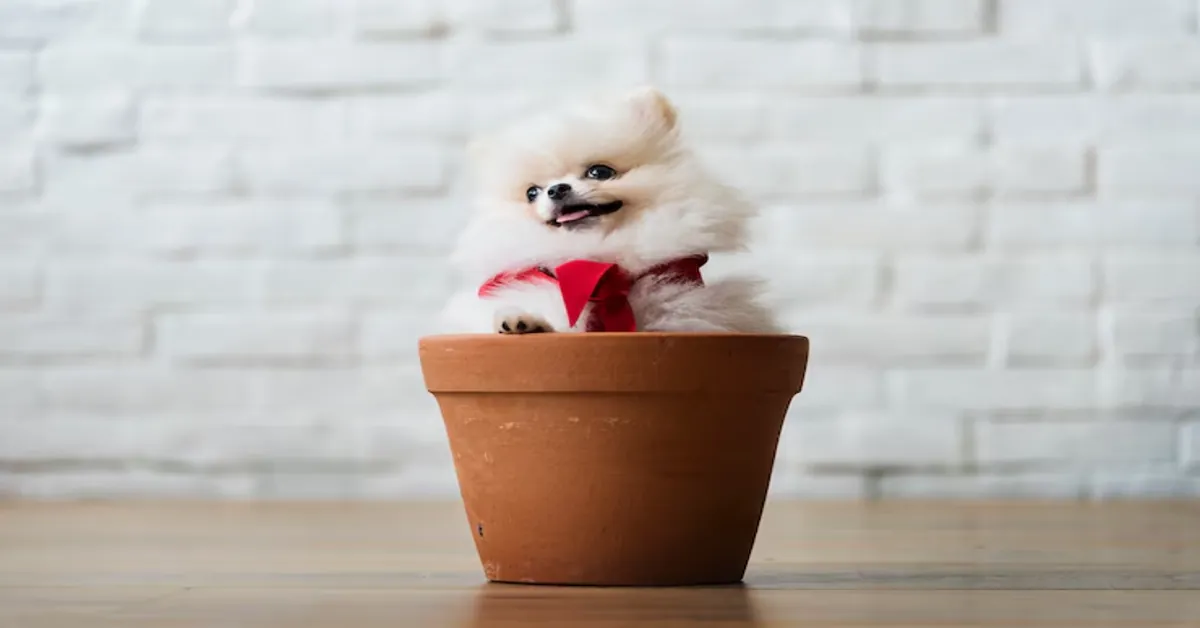You’re looking for a dog that may fit in your handbag but fills your heart with affections; teacup Chihuahua might be the one for you. Little in size, they do quite pack that punch in vicious temperament and adorable personality.
Be it your first pet or a companion to thousands you already have, knowing the essential aspects that make these special little pooches tick will go a long way in ensuring that you have a happy and healthy life together. Whether it is health care or temperament, training tips or adoption advice, this is your complete guide to everything you wanted to know.
What Is a Teacup Chihuahua?
A teacup chihuahua is not officially a different breed, as it is simply a smaller type of the normal chihuahua. Teacup chihuahuas usually weigh no more than 5 pounds when fully grown and reach up to only 6 inches tall.
The concept of ‘teacup’ applies to their size-they are small enough to be picked up inside a teacup, although this term is more for marketing than official breed standards. Small and delicate, they are bred mostly throughselective breeding of the smallest littermates.
Teacup Chihuahua vs. Standard Chihuahua
While both types are purebred chihuahuas, there are some differences:
| Feature | Teacup Chihuahua | Standard Chihuahua |
|---|---|---|
| Weight | 2-5 lbs | 3-6 lbs |
| Height | Up to 6 inches | 6-9 inches |
| Lifespan | 7-12 years | 12-20 years |
| Health Risks | Higher | Lower |
| Breeding Purpose | Companion only | Companion/Show |
Physical Characteristics
Teacup chihuahuas have all the adorable features you’d expect, just in miniature:
Heads that are apple-shaped.
Large and expressive eyes.
Oversized ears.
Light-boned.
Smooth or long coats of any color listed in the book.
Small size equals fragility; therefore, gentle handling is compulsory not optional.
Personality and Temperament
A teacup chihuahua is a small dog but possesses the energy of a typical dog; they’re described as follows:
They are:
- Alert and watchful.
- Loyal and clingy to one person.
- Feisty and brave.
- Loud and protective.
Most importantly, they thrive in attention and become overly lovable when appropriately socialized.
Common Health Issues
Due to their small stature, teacup chihuahuas tend to be more susceptible to health problems than their normal-sized counterparts. Some common health problems include:
Hypoglycemia (low blood sugar)
Various heart ailments such as heart murmurs
Collapsed trachea
Dental disease
Fractures in bones due to accidents
Hydrocephalus (fluid accumulated in the brain).
Routine checks done at the veterinary clinic along with preventive care are very important for this breed.
Diet and Nutrition
Feeding the Teacup Chihuahua requires special care.
The feeds must be small and divided and repeated for about 3-4 times a day to prevent hypoglycemia. The diet must include high-quality kibble meant for toy breeds. No table scraps-no as the stomachs cannot hold rich or fatty foods.
Work with your vet to determine the ideal calorie intake based on age and activity.
Teacup Chihuahua Grooming Requirements
Teacup chihuahuas can either be short-haired or long-haired; however, grooming needs depend on the type of hair:
Short coat: It is recommended to brush once a week.
Long coat: Brush it for 2-3 times a week to prevent tangles.
Regular nails trimming and ear cleaning and dental hygiene are must.
Because their mouths are tiny, they are more prone to dental problems as well, so think of daily brushing.
Movement and Mental Exercises
These tiny puppies do not have to exert much body movement. However, they should get regular stimulation.
Ideal Walks and Games Definitely Include the Following:
Short walks and indoor play.
Puzzle toys and training sessions keep their minds sharp.
Avoid overexertion especially during hot weather.
A tired chihuahua is a happy chihuahua, even if that means just 15 minutes of activity in a day.
Ideal Living Environment
Teacup chihuahuas are great for small spaces like:
Apartments
Condos
Elderly living communities
However, they are so small and delicate that they would not be quite great in homes having:
Small children
Bigger pets
Rough play.
They do well in quiet places with watchers.
Training Your Teacup Chihuahua
These tiny beasts are very clever and tend to be a bit obstinate. Start training early with the following:
Positive reinforcement techniques (treats, praise)
Crate training to ensure that your pet has a safe place
Socialization with people and other dogs
Consistent rules and boundaries
Be patient: chihuahuas can be notoriously slow about potty training due to the size of their bladders.
Traveling With Your Tiny Pup
Teacup chihuahuas travel extremely well:
Airline approved carriers are suited to their size.
They do well in car seats or booster seats to keep them safe.
Pack their things including food, bowls, medications, a blanket, and toys.
Many hotels and vacation rentals welcome small dogs, making them easy to travel with.
Teacup Chihuahua Puppies: What to Know
Thinking about getting a teacup chihuahua puppy? Here are some things to keep in mind:
Constant supervision in the early weeks is a must.
Signs of hypoglycemia include lethargy, weakness, or tremors.
Puppy-proof your home. Very small gaps can become dangerous.
Routines must be established early to aid against behavioral problems.
Always buy your puppies from reputable breeders that guarantee health.
Are They Family or Senior-Friendly?
For Families:
If there are toddlers around, the teacup chihuahua puppies are unsuitable as they are fragile.
They would be better off with older kids who can be taught how to handle them gently.
For Senior Citizens:
They make excellent lap and companion dogs with minimal exercise requirements.
They’d offer great emotional support and companionship.
Expenses of Keeping a Teacup Chihuahua Puppy
The initial and recurring costs can really mount up. Here is a rough breakdown:
Purchase Price: $1,200 – $5,000
Vet Visits: $200 – $600/year
Food and Supplies: $30 – $50/month
Insurance: Highly recommended due to potential health problems.
Being trained until October 2023.
Finding a Good Breeder
Steer clear of puppy mills or breeders lacking health documentation. When searching for a reputable breeder, consider:
Referrals from trusted veterinarian or dog clubs
Breeders who welcome potential owners at the breeder’s site
A contract with a health guarantee
Evidence of health screening for recognizable genetic disorders
If adopting an adult dog appeals to you, you might want to consider the option of rescue.
Conclusion
One might call the teacup chihuahua a little mite, but it is filled with charm, loyalty, and personality. With proper care, this little piece of fluff can warm your home. You could get attracted to the breed through their adorable eyes or their sassy personalities, owning one is a commitment full of rewards.
Frequently Asked Questions (FAQs)
Q1: How long do teacup chihuahuas live?
A: Most live 7-12 years, but with excellent care, some can live longer.
Q2: Are teacup chihuahuas good with other pets?
A: They can be, but early socialization is crucial. Avoid rough-playing dogs.
Q3: Do they bark a lot?
A: Yes, they’re naturally vocal and alert—but training can minimize excessive barking.
Q4: Are teacup chihuahuas hypoallergenic?
A: No, they’re not hypoallergenic. They shed lightly but can still trigger allergies.
Q5: Can I leave a teacup chihuahua home alone?
A: For short periods, yes. But they do best with companionship and a predictable routine.
Thinking of adding one to your life? Do your research, prepare your home, and get ready for a lifetime of little snuggles.









